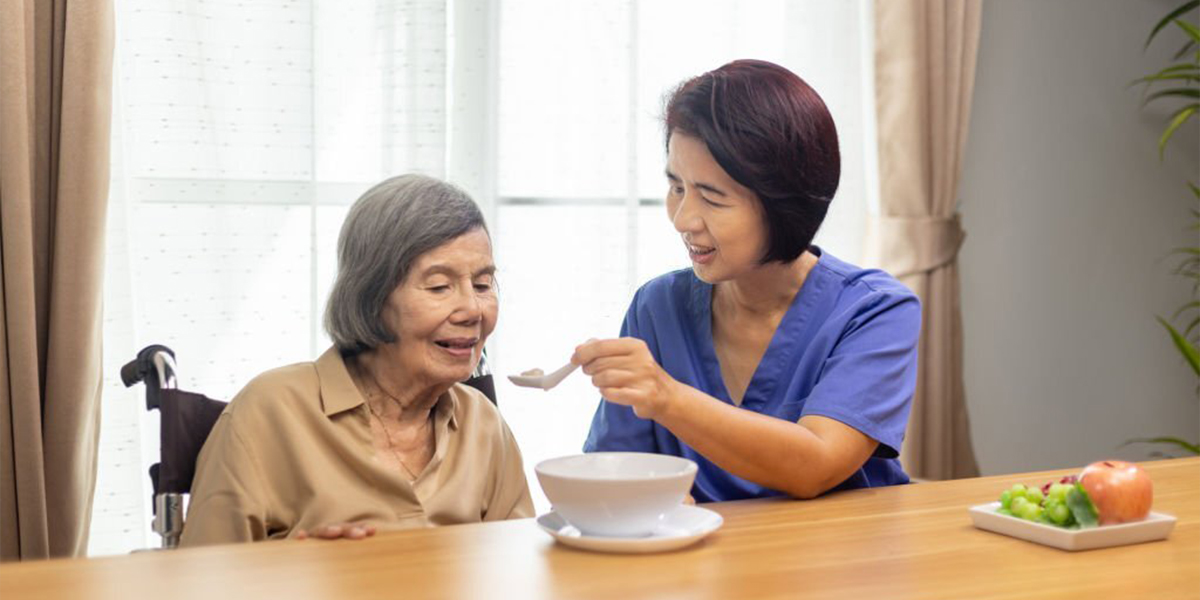Challenges and Tips to achieve optimal nutrition in Dementia elders
Consuming nutritious foods is indispensable for humans at every stage of life. Forgetting daily routines, people, things, and life events are witnessed in seniors with dementia. Forgetting to eat and drink is no surprise in dementia seniors. Maintaining optimal nutrition status by promoting a healthy diet for dementia patients is crucial. There are several fences that block achieving nutritional adequacy in seniors.
Hindering Factors
The
causes of stunting successful nutritional status in seniors with dementia are
many. Poor nutrition sparks behavioral changes, malnutrition, and worsening of
the condition. The common causative factors are discussed below.
● Forgetfulness: The primary symptom of dementia- forgetfulness,
makes seniors forget to eat and drink adequately.
● Blurred recognition: The senior may be unable to
recognize the food plated for them due to their clinical state and may refuse
to consume the food. At times, they may have confusion in recognizing the food.
● Poor oral care: Problems with denture fittings and missing teeth are
a big barricade for elders when it comes to eating. Getting their dentures fit
well and checking their oral health regularly is vital.
● Inactive status: Physical activity is essential to
improve appetite. Seniors with dementia generally may have social anxiety and
wish to stay indoors with minimal activity.
● Anosmia and Ageusia: Loss of smell (anosmia) and taste
(ageusia) sets in with changes in the taste palate and smell glands as we age.
For seniors with dementia, food may not taste as good as it did, which may stop
them from eating well.
● Drup interruption: Certain medications may exert an
influence on appetite. Introducing new drugs can also affect the seniors’
appetite levels.
● Lack of concentration: Seniors with dementia may find it
hard to concentrate which makes concentrating on what one eats and how much a
difficult task.
● Poor coordination: The inability to coordinate
movements to bring food to the mouth can be observed in seniors with dementia.
● Psychological changes: Due to mood swings, depression,
and anxiety, they may refuse to eat well. Seniors may experience paranoia
around food and may express their fear by refusing to eat or spitting out food.
Bitter Notes
The
consequences of inadequate food intake are
-
Malnutrition
-
Weight loss
-
Dehydration
-
Respiratory issues
-
Reduced strength and performance
-
Fatigue
-
Increased risk of infections
Tips
Seniors
with dementia are at risk of malnutrition due to challenges in eating. Healthy eating tips for older adults with
dementia are discussed below.
Surrounding: Avoid distractions during
meal time. The dining space should be well-lit and ventilated. Ensure a calm
and quiet surrounding by avoiding television and other interruptions.
Setting the table: The table settings should
be simple and minimal. Patterned plates, placemats, and tablecloths are best
avoided. Avoid using several utensils. Place only the necessary ones to be used
by the senior to avoid confusion.
Cutlery usage: Use plates with rims or
bowls for easy usage. Spatial and visual abilities will be changed for seniors
with dementia. Helping them distinguish the food and plate by using the right
type of cutlery is important.
Serving foods: Present one food at a time and avoid overloading their plates with varieties. Serve foods they are familiar with and avoid introducing new dishes. Their preferences may keep shifting. They may start liking foods they previously didn’t. Hence staying flexible when cooking or serving them is crucial.
Food temperature and consistency: Most seniors with dementia find it difficult to identify if the food is too hot or cold. Foods and beverages should be tested for the right temperature before serving seniors. Consistency of the food matters as most of them may have dysphagia. The meals prepared should be easy to chew and swallow. Ground, mashed, non-sticky, well-cooked foods should be preferred.
Calm meal time: Do not rush but let them
eat at their own pace. Practice family meal times which gives them an
opportunity to socialise. They may forget when and what they eat and explain to
them with politeness.
Promote Independence: Provide the seniors with the right resources to help them feed themselves. Finger foods can also be considered as they help maintain independence and require minimal feeding assistance. Being independent gives them a feeling of confidence and respect. Dementia is never an exception for seniors’ dignity.
Physical activity: Consider engaging the seniors in physical activities they can perform. Improving their activity status increases their appetite.
Setting a routine: Help them set a routine meal time and remind them to stick to it. Involving the seniors in meal planning and cooking (if possible) can be helpful too.
Not to Forget: Dehydration
Drinking fluid is as important as eating food. Dehydration sets in among seniors with dementia due to inadequate intake of water. Dehydration can ignite several other adverse consequences in seniors. Water is an elixir of life as it stages important functions in the body. From lubricating the joints to controlling body temperature, water is crucial for all organs of the body. Muscle cramps, dry mouth, dizziness, changes in heart rate, poor coordination, and challenges in balance and mobility can occur due to dehydration. Hence it is important to ensure that seniors drink adequate water to keep themselves hydrated.
Final Call
Dementia
is a clinical condition manifested by forgetfulness. Maintaining an optimal
nutritional status among seniors with dementia can be challenging. Athulya Senior Care is a master of
geriatric care that understands and provides every support a senior with
dementia may need. At Athulya’s Assisted Living facilities, dietitians evaluate
and personalize the diet of dementia
seniors to make sure they are nutritionally full. Athulya’s Dementia Care embodies all types of care and support a
dementia senior may require. Routine doctor check-ups, memory-boosting
activities, nutritious meals, and compassionate care are the main courses on
the menu for dementia seniors at AthulyaAssisted Living. To learn more information, visit our website Athulya Senior Cae.




Comments
Post a Comment